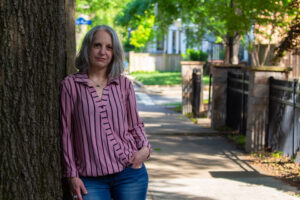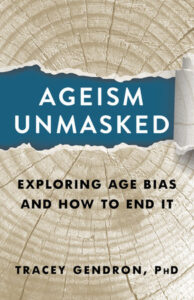AGEISM UNMASKED: An Interview with Author Tracey Gendron, PhD by Melissa Couch Salim
 When did you discover ageism and become passionate about it? I have been studying aging for over 25 years, but it was only about 10 years ago that I recognized just how invisible and pervasive ageism is. While giving a talk, I related that I became a gerontologist because I wanted to work with the “aging population.” In that moment, I had a revelation. Why was I talking about the aging population as if it only included older people? I’m aging, you’re aging, we are all aging! I really meant to say that I enjoyed working with older adults. Recognizing that distinction lit a fire in me to understand ageism more deeply, and the more I learned, the more passionate I became. I realized for the first time that our dominant cultural narrative manipulates us into equating aging as being old and being old as scary and undesirable.
When did you discover ageism and become passionate about it? I have been studying aging for over 25 years, but it was only about 10 years ago that I recognized just how invisible and pervasive ageism is. While giving a talk, I related that I became a gerontologist because I wanted to work with the “aging population.” In that moment, I had a revelation. Why was I talking about the aging population as if it only included older people? I’m aging, you’re aging, we are all aging! I really meant to say that I enjoyed working with older adults. Recognizing that distinction lit a fire in me to understand ageism more deeply, and the more I learned, the more passionate I became. I realized for the first time that our dominant cultural narrative manipulates us into equating aging as being old and being old as scary and undesirable.
What is the most traumatic effect ageism has on society? Ageism robs us of many things, including our own health and longevity. It also robs us of meaning and purpose in later life. A study out of Yale found that people with negative attitudes about their own aging (internalized ageism) live 7.5 years LESS on average than those with positive views. To me, that is a tragic and traumatic consequence of an ism we tolerate every day.
Is ageism too ingrained in society to ever change? Absolutely not. The first step in effecting change is mass awareness of the issue, and there are more and more people championing against ageism every day. Eventually, we reach critical mass, and people start to ask questions. Who benefits from ageism? Who benefits from a blind desire to look and act youthful. Who gets to define what successful aging really means? Who gets to determine what and who we value? For example, when you look at the evolution in how we think about gender roles throughout the last few decades, you see an incredible shift in perceptions. It took a lot of people, a lot of advocacy and a lot of hard work (and of course, more to be done), but we have witnessed a positive change and more equity. We can do that with aging and ageism as well.
How do you foresee this changing? I believe that the change is underway. There are more sources of information and resources about ageism now than ever before. More and more people are recognizing that ageism is a threat to our health, happiness and even our economy. Some corporations are starting to address ageism in their DEI initiatives. Ultimately though, change will happen one person at a time. As each one of us chooses to value our aging and to look forward to our own elderhood – that is when the authentic movement will take place. That is why I wrote Ageism Unmasked. I want to provide an opportunity for each of us to re-vision our own aging and create meaning, purpose, and value for ourselves and our loved ones as we all age.
In your book you share how society can equally discriminate towards youth without realizing it. Do you think judging anyone based on age is ageism and hence wrong? Yes, all discrimination based on age is ageism. When we stereotype or label or make assumptions or place value on age (either younger or older), we participate in ageism. One obvious example is that it is equally ageist to automatically assume someone is too young for a job as it is to think someone is too old. It’s essential to consider that the more we direct ageism toward younger people (or younger generations), the more we feed their ageism toward not only older people…but older versions of themselves. It is a cyclical phenomenon.
Baby Boomers, you say in your book, are significant contributors to our economy and yet you mention on social media the term boomer remover was trending? Why do you feel this happened, and what is a boomer remover? ‘Boomer remover’ is a term that was used during the start of COVID-19 to express that the virus was most deadly for older people. The underlying sentiment being ‘why care about a virus when only boomers or old people die from it.’ This type of generational rhetoric is nothing new. For instance, I can point to countless articles blaming the Millennial generation for everything from ruining the diamond industry to ruining the pet food market. This pitting of generations against each other is not only unproductive, but it is also patently false. Generational labels are broad stroke descriptions of a diverse group of people that were born within the same 15-20 year span. The assumption is that because people were born around the same time, they have shared interests, attitudes and values. The notion is absurd because our lives are intersectional and each of us experiences events differently. To think that we feel the same because we lived through the same historical time frame makes no sense. So these broad assumptions, judgments and stereotypes create manufactured tension between generational groups. Terms like ‘boomer remover’ and ‘entitled millennial’ are misplaced insults directed at an imagined group.
MotherhoodLater.com is a community for women who became moms over age 35. How do you feel society sees them? This is a great question, but one I don’t know if I can answer. Much like with any large group of diverse people, one’s experience will vary. There are so many variables that I can envision everything from praise to hostility.
Do you see positives in later in life parenthood? If so, what? Absolutely, yes. As we age and grow, we develop new skills through experience and maturity that enable us to be better and better versions of ourselves. Having more lived experiences that come with age, we have the advanced capacity for emotional and psychological well-being. For example, as we age, we learn valuable skills and coping mechanisms to better regulate our emotions, choose healthy relationships and develop integrative thinking. Parenthood in later life can bring opportunities to benefit from the development and learning that took place earlier in life.
 Dr. Tracey Gendron serves as Chair for the Virginia Commonwealth University Department of Gerontology. Tracey has a Master’s degree in Gerontology, a Master’s degree in Psychology, and a Ph.D. in Developmental Psychology.
Dr. Tracey Gendron serves as Chair for the Virginia Commonwealth University Department of Gerontology. Tracey has a Master’s degree in Gerontology, a Master’s degree in Psychology, and a Ph.D. in Developmental Psychology.
With over 25 years of experience as a gerontologist, Dr. Gendron has authored and co-authored over 30 manuscripts and seven book chapters on ageism and aging-related topics. She is frequently quoted in popular media outlets, including the New York Times, the Huffington Post, and U.S. News and World Report. Dr. Gendron has spoken about ageism in forums across America and can also be seen and heard as a guest speaker on numerous podcasts and video productions. Visit https://www.penguinrandomhouse.com/books/700435/ageism-unmasked-by-tracey-gendron/.
Tags: ageism, aging, generontologist, later motherhood, tracy gendron
















One Response to “AGEISM UNMASKED: An Interview with Author Tracey Gendron, PhD by Melissa Couch Salim ”
Tracey Gendron, PhD
I so enjoyed reading your interview with Melissa
Couch Salim. I especilly liked your comment, statement.. “I enjoyed working with older adults”
that lit my fire” A very nice Compliment for WE
Older Adults. Really enjoyed the complete interview. Very well done!!! Wilma J Couch
By wilma J. Couch on Jan 24, 2022